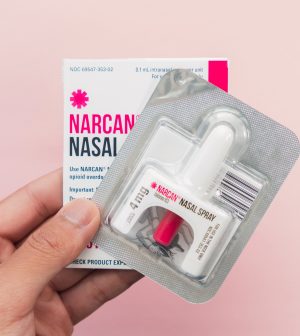- Could Your Grocery Store Meat Be Causing Recurring UTIs?
- Are You Making This Expensive Thermostat Error This Winter?
- Recognizing the Signs of Hypothyroidism
- 10 Strategies to Overcome Insomnia
- Could Artificial Sweeteners Be Aging the Brain Faster?
- Techniques for Soothing Your Nervous System
- Does the Water in Your House Smell Funny? Here’s Why
- Can a Daily Dose of Apple Cider Vinegar Actually Aid Weight Loss?
- 6 Health Beverages That Can Actually Spike Your Blood Sugar
- Treatment Options for Social Anxiety Disorder
FDA Panel Says Opioid Overdose Antidote Safe to Sell Over-the-Counter

A nasal spray that can reverse an opioid overdose should be sold over-the-counter, two expert panels to the U.S. Food and Drug Administration recommended Wednesday.
Research has shown that wider availability of naloxone — brand named Narcan — could save lives as the opioid epidemic rages on in this country.
The FDA advisors voted unanimously in favor of making the drug easier to access after a daylong meeting that focused on whether untrained users would be able to safely and effectively use the nasal spray in emergencies, the Associated Press reported.
The recommendation came despite concerns from some panel members about the clarity of the drug’s instructions and packaging, which caused confusion among some people in a company study. The manufacturer, Emergent Biosolutions, said it would revise the packaging and labeling to address those concerns, the AP reported. The FDA will make a final decision on the drug in the coming weeks.
“Perfect should not be the enemy of the good, and the evidence we saw today provides clear indication that the drug can be used without the direction of a health care provider,” said panel member Dr. Brian Bateman, of Stanford University.
In a statement, the American Medical Association applauded the panel’s decision.
“The AMA believes greater access will occur when naloxone for overdose risk is just as easily accessible in a pharmacy, grocery store and other common locations as acetaminophen for a headache or a decongestant for a stuffy nose,” the group representing doctors said. “We urge the FDA to make a speedy and final determination in favor of over-the-counter access.”
FDA officials who were at the meeting agreed, the AP reported.
“We believe that nonprescription naloxone may help address these barriers [in access],” said Dr. Jody Green, the FDA’s deputy division director for safety for the Division of Nonprescription Drugs. She noted that the switch would allow the drug to be sold in vending machines, convenience stores and supermarkets, the AP reported.
Although naloxone is already available without a prescription, it must be obtained directly from a pharmacist. Not all pharmacies stock it, either, CNN reported.
“Allowing it to be over-the-counter in the same manner in every state really clears up some confusion and hopefully clears up some of that red tape,” said Kirk Evoy, a clinical associate professor of pharmacotherapy at the University of Texas at Austin who has studied the issue.
Allowing naloxone to be sold without a pharmacist’s involvement may also remove some of the stigma associated with it, he said.
“I would hate for that to be the reason why somebody doesn’t have access to a drug that could save a life,” Evoy told CNN.
The Biden administration has been pushing to make naloxone more available, CNN reported.
In the year ending August 2022, more than 107,000 Americans died of a drug overdose. More than two-thirds of those deaths involved fentanyl and other synthetic opioids, according to the U.S. Centers for Disease Control and Prevention.
Naloxone has been approved by the FDA since 1971. It was first used in hospitals and by first responders to resuscitate those who might have died of an overdose, CNN reported.
Laws allow naloxone to be sold without a prescription in all 50 states, Puerto Rico and Washington, D.C.
Good Samaritan laws in most states would also protect people who administer the medication to someone who is overdosing, CNN reported.
“The more you can administer naloxone, the more likely it is that we’ll have positive results,” Evoy said. “And more likely we’ll be able to save a life with this medication.”
More information
The U.S. Centers for Disease Control and Prevention has more on the opioid overdose epidemic.
SOURCE: Associated Press; CNN; statement, American Medical Association
Source: HealthDay
Copyright © 2026 HealthDay. All rights reserved.










